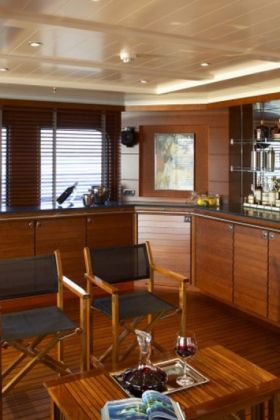
F.A.Q
FAQ – Frequently Asked Questions
1 – What is the minimum length of charter and how are the rates calculated? – FAQ
Sailing yachts Charters over seven days are calculated pro-rata against the weekly rate divided by seven and multiplied by the number of charter days. During low season periods, some yachts may consider charters of less than seven days. Charters commence from noon onwards on the first day and terminate by noon on the last day.
For example, a charter contracted to commence at noon on 1st June and terminate at noon on 8th June constitutes a one-week charter. High season rates apply to Jul /August and Christmas/New Year, Midseason rates apply to June and September Low season rates apply to May and November Please note that charter rates quoted on this site are believed to be correct but may be subject to change Frequently asked about yacht charter questions.
2 – Is VAT applicable on the charter fee? – FAQ
Please note that due to European Union tax legislation, Value Added Tax (such as French tva, Italian ıva, etc) applies on the gross charter fee for charters taking place in European Union Waters on yachts which are not commercially registered. Turkish vat is 18% plus 2 % if paid by credit cards via our pos machine
3 – What is included within the charter rate? – FAQ
Most charter rates that appear on this website are based on myba Terms, which imply that the yacht will be provided to the charterer in full commission and with all necessary equipment, properly insured for marine risks and managed by a crew, whose wages, food and clothing are for the owner’s account.
All other operating expenses are payable by the charterer and comprise (but are not restricted to) the following items: fuel and lubricating oils for the yacht, her tenders, and motorized water toys; local taxes; pilotage; port, harbor, and marina dues; customs clearance; water and electricity; personal laundry; all provisions, wines, beers, spirits, soft drinks and consumables including satellite telecommunication if any for the charterer’s party. Please note that, occasionally, a yacht may offer a variation on the terms described above. our brokers will provide full details of any charter terms that vary from standard myba Terms when presenting the relevant yachts
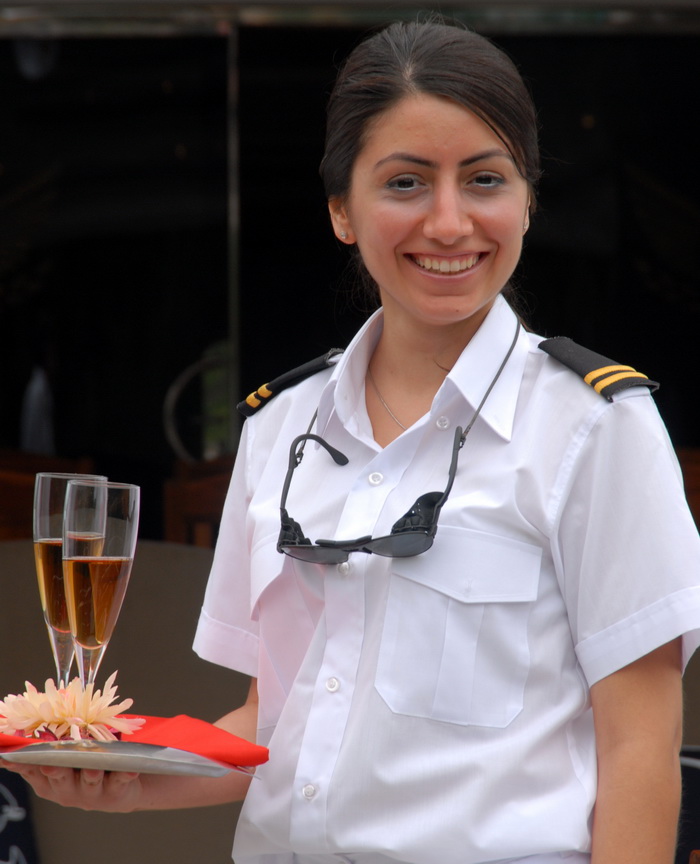
4 – What is MYBA? – FAQ
Myba is an acronym for the Worldwide Yachting Association. It is a trade association founded in 1984 by a group of prominent yacht brokers with the aim of promoting standards of professionalism and ethics in the yachting industry throughout the Mediterranean, and worldwide. Myba only endorses membership to brokerages with a proven track record of professional excellence in the yachting industry, thereby offering valuable benefits and safeguards to clients choosing to purchase, sell, build or charter a yacht through MYBA brokers.
5 – What do I need to do to secure my chosen yacht? – FAQ
All charters are subject to a fully executed contract, so once the availability for your chosen yacht has been verified, you will receive a standard myba Charter Agreement for signature. If your chosen cruising itinerary necessitates embarking or disembarking from a point other than the yacht’s home port, positioning charges (delivery and redelivery fees) may be required. These charges, if applicable, will be confirmed in advance and affirmed in the Charter Agreement, together with any taxes that may apply.
6 – What are the payment terms for a charter? – FAQ
A deposit of 50% of the total charter fee is payable by bank transfer on the signature of the Charter Agreement. This confirms your booking. The remaining 50%, plus an Advance Provisioning Allowance, together with any taxes, delivery/redelivery fees and any additionally agreed charges, is payable by bank transfer one month before the charter commences.
7 – What is APA and how is it calculated? – FAQ
The Advance Provisioning Allowance (Apa) is due at the time of the final charter payment. Under myba Terms, this sum is usually equivalent to 25% of the total charter fee, but maybe 30% in some cases. Intended to cover the operating expenses of a charter such as fuel, food, drinks, port fees, these funds will be given to the captain before the start of your charter. He will ensure that your yacht is fully fuelled and provisioned when you step on board.
Whilst an up-to-date summary of accounts can be requested at any time during your charter, a full set of accounts will normally be submitted by your captain at the end of the cruise. If during the charter, the expenditure exceeds the sum already paid, additional cash funds will be required at once. All outstanding bills should be settled in cash before final disembarkation. Of course, any remaining credit at the end of your charter will be reimbursed to you in full. On request, transfer arrangements to and from the yacht can be made by us or by your captain, payment for which will be deducted from your APA.
8 – Can I specify the food and wine to be served aboard the yacht? – FAQ
Every detail counts. Several weeks before you board your yacht, we will ask you to complete a detailed questionnaire describing the preferences and special needs of all the members of your party, such as dietary or medial requirements, details of any allergies, and your sporting or entertainment requests. This will enable us and the crew of your chosen yacht to ensure that everything possible is done to make your charter a fabulous experience.
9 – Do all yachts accept children on board? – FAQ
Most yachts are very welcoming to children and some are equipped with children in mind. However, a few yachts may stipulate a minimum age for children and/or have a requirement for a nanny to be on board during the charter. The crew cannot provide childminding or babysitting services. Please inform your broker at the outset of planning your charter if there are children in your party.
10 – Can I smoke on board the yacht? – FAQ
Smoking is not permitted inside most yachts. However please consult us for verification, as this policy may vary on certain yachts. For safety reasons, smoking in cabins and staterooms is prohibited on all yachts.
11 – How much should I tip the crew? – FAQ
Crew gratuities are discretionary, although it is customary for a charterer who has enjoyed the kind and attentive service of an obliging crew to extend a gratuity. Crew gratuities are normally in the region of 10% of the charter fee, but can be adjusted up or down according to your level of satisfaction. The best way to ensure that all crew members receive equal recognition is to entrust the distribution of gratuities to the captain. In this way, inconspicuous crew members such as engineers and culinary staff, who make an important contribution to your safety and enjoyment, will not be overlooked.
12 – Am I covered by insurance? – FAQ
We recommend that charterers take out Cancellation and Curtailment Insurance to protect their investment if unforeseen circumstances prevent or curtail their charter. Additionally, all members of the charter party should be covered by Personal Accident and Medical Insurance, and their personal effects should be insured against theft, loss or damage. Other forms of insurance, such as Charterer’s Liability may also be prudent. our brokers will be pleased to assist with arranging any policy not covered by the basic Charter Agreement.
13 – Am I permitted to use the yacht’s watersports toys and Scuba equipment? – FAQ
In certain countries, a Certificate of Competency is required to participate in watersports activities (jet skis, waverunners and other mechanically propelled watercraft). Please consider which members of your party will want to use the yacht’s motorized water toys. If they do not have the required licenses/certificates we can arrange for an instructor to come on board the yacht during the charter to issue a certificate.
Please note that all tuition fees are for the charterer’s account and the availability of local instructors cannot be guaranteed. Certain areas prohibit the use of motorized water toys altogether. Use of personal watercraft is only permitted subject to the operator having the appropriate license and meeting with local operating regulations. Any liability arising from non-compliance is entirely at the operator’s risk. If the yacht has Scuba equipment on board, it may only be used by certified divers holding a certified Padi license or equivalent.
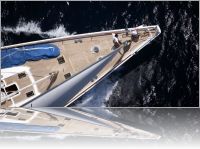 Yacht Rental Turkey
Yacht Rental Turkey, crewed motor yacht or gulet charter in the warm waters of the Mediterranean or the Aegean. With motor sailing gulets in...
Yacht Rental Turkey
Yacht Rental Turkey, crewed motor yacht or gulet charter in the warm waters of the Mediterranean or the Aegean. With motor sailing gulets in... 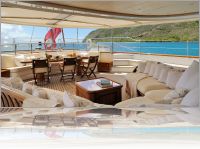 Yacht Rental in Turkey
Yacht Rental in Turkey If your dreams are endowed with imagination and you would like to be served dinner by candlelight under the...
Yacht Rental in Turkey
Yacht Rental in Turkey If your dreams are endowed with imagination and you would like to be served dinner by candlelight under the...  Gulet Rental in Turkey
Gulet Rental in Turkey Luxury traditional gulet rental in Turkey is cruising the warm blue waters of the eastern...
Gulet Rental in Turkey
Gulet Rental in Turkey Luxury traditional gulet rental in Turkey is cruising the warm blue waters of the eastern... 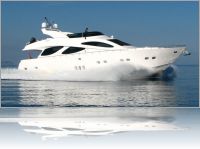 Motor Yacht Rental
Motor Yacht Rental The warm climate and the traditional hospitality of Turkish people plus the eternal intimacy between Anatolia and...
Motor Yacht Rental
Motor Yacht Rental The warm climate and the traditional hospitality of Turkish people plus the eternal intimacy between Anatolia and... 




